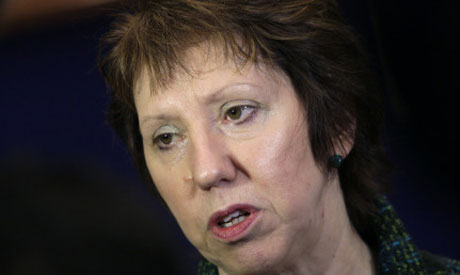
EU foreign policy chief Catherine Ashton, (Photo: AP).
The European Union (EU) on Monday threw its weight behind an Arab League plan for a transitional government in Syria leading to elections, an attempt to end the violent repression by the regime of President Bashar Al-Assad.
EU foreign ministers also extended measures against Assad's government by adding 22 more officials and eight more companies to a sanctions regime. EU nations also called for United Nations action to end the repression that the UN says has left more than 5,400 people dead.
EU high representative for foreign policy and security policy Catherine Ashton said she had spoken with Arab League chief Nabil El-Araby and backed the call for the establishment of a national unity government in Syria within two months.
Britain and Germany also came out in defence of the Arab League approach and the need to resume action as soon as possible at the UN Security Council.
"We will push for the EU to support the Arab League's action" and to call for the UN Security Council to get involved, German Foreign Minister Guido Westerwelle said. "The issue belongs in the Security Council as the highest guardian of international peace."
EU nations were hoping the Arab League would put proposals before the United Nations.
The Arab League called for the establishment of a national Syrian unity government within two months, including government and opposition members and led by a consensus leader.
The mandate of this government, according to the Arab League statement, would be to prepare for free parliamentary and presidential elections to be held under Arab and international supervision.
The proposal also provides for Assad to give his vice president full powers to cooperate with the proposed national unity government to enable it to carry out its duties during a transitional period.
"Of particular significance is an approach that is reminiscent to the approach of the (Gulf Cooperation Council) in Yemen, looking to see the transfer to a vice president, the appointment of an envoy — Nabil is looking how to achieve that — and also to go the Security Council to seek support for those in initiatives," Ashton said.
Following months of diplomatic efforts by the Gulf nations to ease the nearly year-old political crisis in Yemen, longtime President Ali Abdullah Saleh handed over power on Monday to his deputy and left for medical treatment in the United States.
Short link: